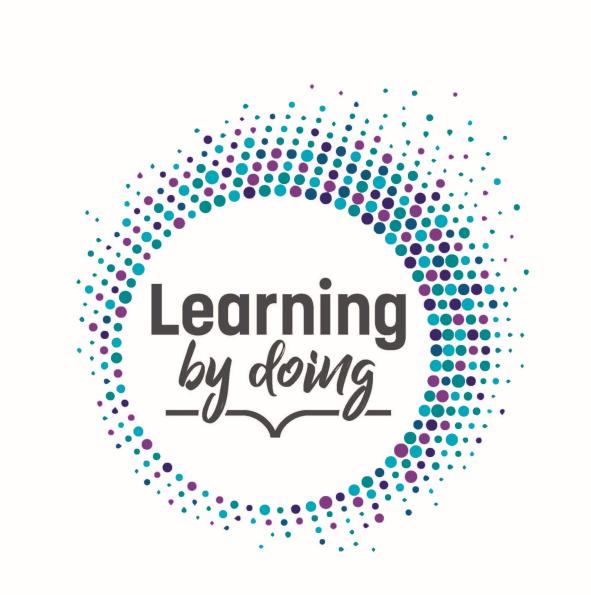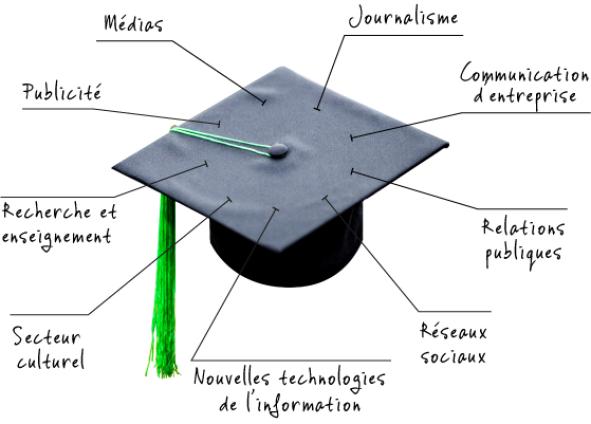Bachelor in Information and Communication
-
Schedule
regular course
- ECTS Credits 180

The bachelor's degree begins with fundamental courses that provide you with a theoretical foundation as well as a solid media culture and a critical approach to interactive and participatory media.
To understand the environment in which information and communication evolve, you study sociology, economics, political science, philosophy, law and history, among other subjects.
In Block 2, you deepen your knowledge of the field of information and communication and explore the professional world. You choose a specialized option: "Journalism and news media", "Organizational communication" or "Culture and audiovisual".
In Block 3, you continue your learning of this specialty, broaden your information and communication skills and complete a professional practice placement.
You're off to a good start
- you are passionate about current affairs, the media, culture and digital technologies;
- you enjoy human relations, whether mediated or not;
- you express yourself fluently both orally and in writing;
- you are critical and analytical;
- you are creative and enjoy working in a team.
Teaching methods
Courses, exercise sessions, communication workshops, internships, collaborative projects... everything is done to ensure excellent mastery of concepts and the development of effective professional skills.
Exercise sessions and assignments help you assimilate and rework the material with quality supervision.
In the courses, the contributions of experts and professionals introduce you to current issues and questions in communications. Journalists, filmmakers and webmasters also lead your practical workshops.
Early in Block 2, you take part in communication workshops. These workshops enable you to tackle the subject through practical activities and the production of communication products such as: writing press articles and corporate documents, website design, audiovisual production (radio and TV journalistic programs, fiction, documentaries...), moderating debates, etc.

Communications managers and journalists from the baccalaureate level!
Project-based learning crosses and mobilizes your knowledge of several disciplines around real-life cases.
Like true communication experts, you learn to work collaboratively and demonstrate multiple skills:
- from observation, documentary research, source criticism, data collection and analysis;
- to the production of a high-quality report - with, in some cases, an executive summary or scientific poster written in English - which you and your team present before a jury.
To boost your foreign-language communication soft skills, coaching is provided by your language teachers.
At the end of the cycle, you have the option of taking a four-quarter course at a Flemish university or abroad to deepen your knowledge of English, Dutch or Spanish.
Learning by doing |
| Projects play an increasingly important part in the course of your bachelor's degree, through concrete and diversified cases : |
IN BLOCK 1:
|
IN BLOCK 2:
|
IN BLOCK 3:
|
The internship: a first professional experience
A full month's internship allows you to discover the reality of the field. In the media, a company, an administration or a cultural organization, you'll enjoy a unique and enriching experience, supervised by communications professionals. A first opportunity to put into practice the skills acquired during your training, refine your professional project and build up your network of contacts.
Success aids
Succeeding in a year of study at university involves many challenges.
To help you meet them, UNamur supports you in developing your disciplinary, methodological and human skills... with the support of numerous professionals.
Preparatory courses, individualized help...
After the baccalauréat: the master's degree
UNamur does not offer any graduate (master's) training in information and communication, but the bachelier gives access to all masters in information and communication in the Federation-Wallonie Brussels, regardless of the option chosen.
Changing institutions between the bachelier and the master allows you to build up a wide network of contacts as they study, in different geographical areas, which is a real advantage for future professionals in the communications field.
-
<unknown>
-
<unknown>
Code Name Staff Th.+Ex. Credits/Block 1 2 3 LHISB204 Belgian political structures and institutions in contemporary times Dodeigne Jérémy Tixhon Axel Talukder David 45h th. 5 Soft skillsEINCB341 Internship and project in journalism: questioning the practice Collard Anne-Sophie Haineaux Esther 50h th. + 225h ex. 20 EPOLB309 Ecological governance Jacquet Vincent 30h th. + 15h ex. 5 EINCB215 Audiovisual Journalism Workshop Collin Pascal 20h th. + 45h ex. 5 -
<unknown>
Code Name Staff Th.+Ex. Credits/Block 1 2 3 EPICB241 Organizational Theory Ajzen Michel 45h th. 5 Soft skillsEINCB342 Internship and project in organisational communication: questioning practice Collard Anne-Sophie Haineaux Esther 50h th. + 180h ex. 15 EINCB216 Digital Communication Workshop Van Eetvelde Antoine 20h th. + 45h ex. 5 ELMSM412 Digital Marketing and Communication Decrop Alain Cornet Jean Torres Fabienne 30h th. 5 EINCB370 Corporate communication Klein Annabelle Lahaye Anne-Catherine 30h th. + 15h ex. 5 -
<unknown>
Code Name Staff Th.+Ex. Credits/Block 1 2 3 LROMB002 Introduction to the language of film Gabriel Jean-Benoît 30h th. 3 Soft skillsEINCB343 Internship and project in culture and audiovisual: questioning practice Lahaye Anne-Catherine Collard Anne-Sophie 50h th. + 225h ex. 20 Soft skillsLHISB320 Critique of film sources Roekens Anne 15h th. 2 EINCB217 Audiovisual creation and research" workshop Hallet Nicolas 20h th. + 45h ex. 5 LARTB302 Museology Lefftz Michel 30h th. 5
-
-
<unknown>
Code Name Staff Th.+Ex. Credits/Block 1 2 3 EPICB142 Communication and media literacy Klein Annabelle Haineaux Esther 45h th. + 15h ex. 5 EPICB143 Interactive and participatory media Barnabé Fanny 30h th. + 15h ex. 5 EINCB364 Analysis of media narratives Klein Annabelle Klein Annabelle 30h th. + 15h ex. 5 Soft skillsEINCB360 Semiotics Collard Anne-Sophie 30h th. + 15h ex. 5 EINCB312 Communication and digital identity Klein Annabelle Haineaux Esther 30h th. + 15h ex. 5 EINCB365 Sociology and history of the media Collard Anne-Sophie Roekens Anne Hallet Marion Haineaux Esther 60h th. 5 EINCB213 Socio-economic structures of the media Barnabé Fanny Antoine Frédéric 30h th. + 15h ex. 5 EINCB214 Communication Writing Workshop Vandenbroucke Catherine Lahaye Anne-Catherine 20h th. + 45h ex. 5 -
<unknown>
Code Name Staff Th.+Ex. Credits/Block 1 2 3 ECGEB140 Sociology Rigaux Natalie 45h th. + 15h ex. 5 ECGEB120 Philosophy De Briey Laurent Ruffo de Bonneval de la Fare des Comtes de Sinopoli de Calabre Marie-Des-Neiges 45h th. + 15h ex. 5 EPICB160 Political Science Dodeigne Jérémy Biard Benjamin Uyttendaele Laura 45h th. + 15h ex. 5 ECGEB121 Economic and social history Roekens Anne 45h th. + 7.5h ex. 5 ECGEB221 Psychology Buxant Coralie 45h th. 4 Translated with DeepL.com (free version)EPICB322 Anthropology Rigaux Natalie Pierre Amélie 30h th. + 30h ex. 5 ECGEB321 Religious Studies Malvaux Paul 30h th. + 15h ex. 4 Translated with DeepL.com (free version)Soft skillsECGEB322 Civic engagement Rigaux Natalie Pierre Amélie 15h th. + 30h ex. 4 -
<unknown>
Code Name Staff Th.+Ex. Credits/Block 1 2 3 ECGEB130 Foundations of law De Streel Alexandre 45h th. + 15h ex. 5 EINCB363 Media law Mouffe Bernard 30h th. + 15h ex. 5 -
<unknown>
Code Name Staff Th.+Ex. Credits/Block 1 2 3 ECGEB170 Economic facts and decisions De Crombrugghe De Picquendaele Alain 45h th. + 15h ex. 5 -
<unknown>
Code Name Staff Th.+Ex. Credits/Block 1 2 3 ECGEB284 Marketing Management Decrop Alain 30h th. + 30h ex. 5 -
<unknown>
Code Name Staff Th.+Ex. Credits/Block 1 2 3 EPICB154 Statistics for the humanities I Kiriliouk Anna Kiriliouk Anna Bugli Céline Bugli Céline 30h th. + 15h ex. 5 ECGEB110 Information Systems I: Introduction and Modelling Verlaine Bertrand 30h th. + 15h ex. 4 EPICB225 Statistics for the social sciences Van Bever Germain Boucher Maxime 15h th. + 30h ex. 5 EPOLB214 Criticism of information sources Collard Anne-Sophie Haineaux Esther 30h th. + 15h ex. 5 -
<unknown>
Code Name Staff Th.+Ex. Credits/Block 1 2 3 EPICB131 Project: Deciphering political communication Klein Annabelle Borriello Arthur Latiers Mélanie Borriello Arthur 37.5h th. + 30h ex. 5 EINCB218 Research Project : Digital Transition Barnabé Fanny Burnay Nathalie 75h th. + 15h ex. 10 -
<unknown>
Code Name Staff Th.+Ex. Credits/Block 1 2 3 Soft skillsEELVB190 Anglais 1 (niveau B1+) Dupal Jérémie Bulon Amélie 30h th. 3 EELVB390 English 3 (level B2) Foissac Patrick Hoorelbeke Christelle 30h th. 3 EELVB290 English 2 (level B1+ or higher) Hoorelbeke Christelle 30h th. 3 -
<unknown>
Code Name Staff Th.+Ex. Credits/Block 1 2 3 EELVB196 Spanish 1 (minimum level A2) Marsily Aurélie 30h th. 3 EELVB296 Español 2 (nivel B1 o superior) Marsily Aurélie 30h th. 3 EELVB396 Español 3 (nivel B1+ o superior) Marsily Aurélie 30h th. 3 -
<unknown>
Code Name Staff Th.+Ex. Credits/Block 1 2 3 EELVB192 German 1 (minimum level A2) Vanoirbeek Fabienne 30h th. 3 EELVB292 Deutsch 2 (Level B1) Vanoirbeek Fabienne 30h th. 3 EELVB392 Deutsch 3 (mindestens level B1+) Vanoirbeek Fabienne 30h th. 3 -
<unknown>
-
<unknown>
Code Name Staff Th.+Ex. Credits/Block 1 2 3 EELVB181 Kritische benadering van socio-economische onderwerpen Naveau Sophie 30h th. 3 EELVB281 De Vlaamse/Nederlandse bedrijfswereld - interculturaliteit Miceli Marc 30h th. 3 EELVB381 Bedrijfscommunicatie en sollicitatiegesprekken – B2 Hoorelbeke Christelle 30h th. 3 -
<unknown>
Code Name Staff Th.+Ex. Credits/Block 1 2 3 EELVB191 Elementair Nederlands: basisgrammatica, -woordenschat en dagelijkse situaties Miceli Marc Naveau Sophie 30h th. 3 EELVB291 Mondelinge en schriftelijke communicatie in het alledaagse Nederlands Naveau Sophie 30h th. 3 EELVB391 Mondelinge en schriftelijke communicatie op de werkvloer -B1 Miceli Marc Hoorelbeke Christelle 30h th. 3
-
-
-
<unknown>
Code Name Staff Credits Hours/Quarter 1 2 EPICB142 Communication and media literacy Klein Annabelle Haineaux Esther 5 45h th. + 15h ex. EPICB143 Interactive and participatory media Barnabé Fanny 5 30h th. + 15h ex. -
<unknown>
Code Name Staff Credits Hours/Quarter 1 2 ECGEB140 Sociology Rigaux Natalie 5 45h th. + 15h ex. ECGEB120 Philosophy De Briey Laurent Ruffo de Bonneval de la Fare des Comtes de Sinopoli de Calabre Marie-Des-Neiges 5 45h th. + 15h ex. EPICB160 Political Science Dodeigne Jérémy Biard Benjamin Uyttendaele Laura 5 45h th. + 15h ex. ECGEB121 Economic and social history Roekens Anne 5 45h th. + 7.5h ex. -
<unknown>
Code Name Staff Credits Hours/Quarter 1 2 ECGEB130 Foundations of law De Streel Alexandre 5 45h th. + 15h ex. -
<unknown>
Code Name Staff Credits Hours/Quarter 1 2 ECGEB170 Economic facts and decisions De Crombrugghe De Picquendaele Alain 5 45h th. + 15h ex. -
<unknown>
Code Name Staff Credits Hours/Quarter 1 2 EPICB154 Statistics for the humanities I Kiriliouk Anna Kiriliouk Anna Bugli Céline Bugli Céline 5 30h th. + 15h ex. ECGEB110 Information Systems I: Introduction and Modelling Verlaine Bertrand 4 30h th. + 15h ex. -
<unknown>
Code Name Staff Credits Hours/Quarter 1 2 EPICB131 Project: Deciphering political communication Klein Annabelle Borriello Arthur Latiers Mélanie Borriello Arthur 5 37.5h th. + 30h ex. -
<unknown>
Code Name Staff Credits Hours/Quarter 1 2 Soft skillsEELVB190 Anglais 1 (niveau B1+) Dupal Jérémie Bulon Amélie 3 20h th. 10h th. -
<unknown>
Code Name Staff Credits Hours/Quarter 1 2 EELVB196 Spanish 1 (minimum level A2) Marsily Aurélie 3 15h th. 15h th. -
<unknown>
Code Name Staff Credits Hours/Quarter 1 2 EELVB192 German 1 (minimum level A2) Vanoirbeek Fabienne 3 15h th. 15h th. -
<unknown>
-
<unknown>
Code Name Staff Credits Hours/Quarter 1 2 EELVB181 Kritische benadering van socio-economische onderwerpen Naveau Sophie 3 15h th. 15h th. -
<unknown>
Code Name Staff Credits Hours/Quarter 1 2 EELVB191 Elementair Nederlands: basisgrammatica, -woordenschat en dagelijkse situaties Miceli Marc Naveau Sophie 3 15h th. 15h th.
-
-
-
<unknown>
-
<unknown>
Code Name Staff Credits Hours/Quarter 1 2 LHISB204 Belgian political structures and institutions in contemporary times Dodeigne Jérémy Tixhon Axel Talukder David 5 45h th. EINCB215 Audiovisual Journalism Workshop Collin Pascal 5 20h th. + 45h ex. -
<unknown>
Code Name Staff Credits Hours/Quarter 1 2 EPICB241 Organizational Theory Ajzen Michel 5 45h th. EINCB216 Digital Communication Workshop Van Eetvelde Antoine 5 20h th. + 45h ex. -
<unknown>
Code Name Staff Credits Hours/Quarter 1 2 LROMB002 Introduction to the language of film Gabriel Jean-Benoît 3 30h th. Soft skillsLHISB320 Critique of film sources Roekens Anne 2 15h th. EINCB217 Audiovisual creation and research" workshop Hallet Nicolas 5 20h th. + 45h ex.
-
-
<unknown>
Code Name Staff Credits Hours/Quarter 1 2 EINCB213 Socio-economic structures of the media Barnabé Fanny Antoine Frédéric 5 30h th. + 15h ex. EINCB214 Communication Writing Workshop Vandenbroucke Catherine Lahaye Anne-Catherine 5 20h th. + 45h ex. -
<unknown>
Code Name Staff Credits Hours/Quarter 1 2 ECGEB221 Psychology Buxant Coralie 4 45h th. Translated with DeepL.com (free version)EPICB322 Anthropology Rigaux Natalie Pierre Amélie 5 30h th. + 30h ex. -
<unknown>
Code Name Staff Credits Hours/Quarter 1 2 ECGEB284 Marketing Management Decrop Alain 5 30h th. + 30h ex. -
<unknown>
Code Name Staff Credits Hours/Quarter 1 2 EPICB225 Statistics for the social sciences Van Bever Germain Boucher Maxime 5 15h th. + 30h ex. EPOLB214 Criticism of information sources Collard Anne-Sophie Haineaux Esther 5 30h th. + 15h ex. -
<unknown>
Code Name Staff Credits Hours/Quarter 1 2 EINCB218 Research Project : Digital Transition Barnabé Fanny Burnay Nathalie 10 45h th. + 7h ex. 30h th. + 8h ex. -
<unknown>
Code Name Staff Credits Hours/Quarter 1 2 EELVB290 English 2 (level B1+ or higher) Hoorelbeke Christelle 3 30h th. -
<unknown>
Code Name Staff Credits Hours/Quarter 1 2 EELVB296 Español 2 (nivel B1 o superior) Marsily Aurélie 3 15h th. 15h th. -
<unknown>
Code Name Staff Credits Hours/Quarter 1 2 EELVB292 Deutsch 2 (Level B1) Vanoirbeek Fabienne 3 15h th. 15h th. -
<unknown>
-
<unknown>
Code Name Staff Credits Hours/Quarter 1 2 EELVB281 De Vlaamse/Nederlandse bedrijfswereld - interculturaliteit Miceli Marc 3 15h th. 15h th. -
<unknown>
Code Name Staff Credits Hours/Quarter 1 2 EELVB291 Mondelinge en schriftelijke communicatie in het alledaagse Nederlands Naveau Sophie 3 15h th. 15h th.
-
-
-
<unknown>
-
<unknown>
Code Name Staff Credits Hours/Quarter 1 2 Soft skillsEINCB341 Internship and project in journalism: questioning the practice Collard Anne-Sophie Haineaux Esther 20 50h th. + 225h ex. EPOLB309 Ecological governance Jacquet Vincent 5 30h th. + 15h ex. -
<unknown>
Code Name Staff Credits Hours/Quarter 1 2 Soft skillsEINCB342 Internship and project in organisational communication: questioning practice Collard Anne-Sophie Haineaux Esther 15 50h th. + 180h ex. ELMSM412 Digital Marketing and Communication Decrop Alain Cornet Jean Torres Fabienne 5 30h th. EINCB370 Corporate communication Klein Annabelle Lahaye Anne-Catherine 5 30h th. + 15h ex. -
<unknown>
Code Name Staff Credits Hours/Quarter 1 2 Soft skillsEINCB343 Internship and project in culture and audiovisual: questioning practice Lahaye Anne-Catherine Collard Anne-Sophie 20 50h th. + 225h ex. LARTB302 Museology Lefftz Michel 5 15h th. 15h th.
-
-
<unknown>
Code Name Staff Credits Hours/Quarter 1 2 EINCB364 Analysis of media narratives Klein Annabelle Klein Annabelle 5 30h th. + 15h ex. Soft skillsEINCB360 Semiotics Collard Anne-Sophie 5 30h th. + 15h ex. EINCB312 Communication and digital identity Klein Annabelle Haineaux Esther 5 30h th. + 15h ex. EINCB365 Sociology and history of the media Collard Anne-Sophie Roekens Anne Hallet Marion Haineaux Esther 5 60h th. -
<unknown>
Code Name Staff Credits Hours/Quarter 1 2 ECGEB321 Religious Studies Malvaux Paul 4 30h th. + 15h ex. Translated with DeepL.com (free version)Soft skillsECGEB322 Civic engagement Rigaux Natalie Pierre Amélie 4 15h th. + 30h ex. -
<unknown>
Code Name Staff Credits Hours/Quarter 1 2 EINCB363 Media law Mouffe Bernard 5 30h th. + 15h ex. -
<unknown>
Code Name Staff Credits Hours/Quarter 1 2 EELVB390 English 3 (level B2) Foissac Patrick Hoorelbeke Christelle 3 30h th. -
<unknown>
Code Name Staff Credits Hours/Quarter 1 2 EELVB396 Español 3 (nivel B1+ o superior) Marsily Aurélie 3 15h th. 15h th. -
<unknown>
Code Name Staff Credits Hours/Quarter 1 2 EELVB392 Deutsch 3 (mindestens level B1+) Vanoirbeek Fabienne 3 15h th. 15h th. -
<unknown>
-
<unknown>
Code Name Staff Credits Hours/Quarter 1 2 EELVB381 Bedrijfscommunicatie en sollicitatiegesprekken – B2 Hoorelbeke Christelle 3 15h th. 15h th. -
<unknown>
Code Name Staff Credits Hours/Quarter 1 2 EELVB391 Mondelinge en schriftelijke communicatie op de werkvloer -B1 Miceli Marc Hoorelbeke Christelle 3 15h th. 15h th.
-
-
International mobility and openness
Mobilité et ouverture internationale
Les métiers de la communication

Communication professions
The skills acquired in information and communication training enable professionalization in fields such as:
- the journalism (written press, radio, television news, general or specialized journalism...)
- the media (production for television, cinema, video games...)
- the information technologies (digital platforms, social networks, online streaming...)
- the advertising
- the event (festival, trade show, corporate event...)
- the public relations and corporate communication (management of internal and external exchanges within a company, community management, crisis management, management of an organization's image...)
- the socio-cultural sector (museum, theater, concert hall, associative field, continuing education...).
Moreover, the world of communications is constantly evolving and redefining itself: new professions therefore appear regularly, while others are transformed in line with technological innovations and changes in society. Today, for example, we have to imagine new ways of making television following the development of digital platforms and streaming.
Managing social networks internally or externally has become a job taken on by the organization's community manager. To design a media project, it's becoming increasingly common to articulate different media, based on the transmedia model, and to think about the storytelling of content through storytelling. Internet "influencers" are also inventing new ways of communicating, mobilizing the specific features of digital platforms in innovative ways. Curiosity and adaptability are therefore two personal qualities that are essential to thrive in the communications professions.